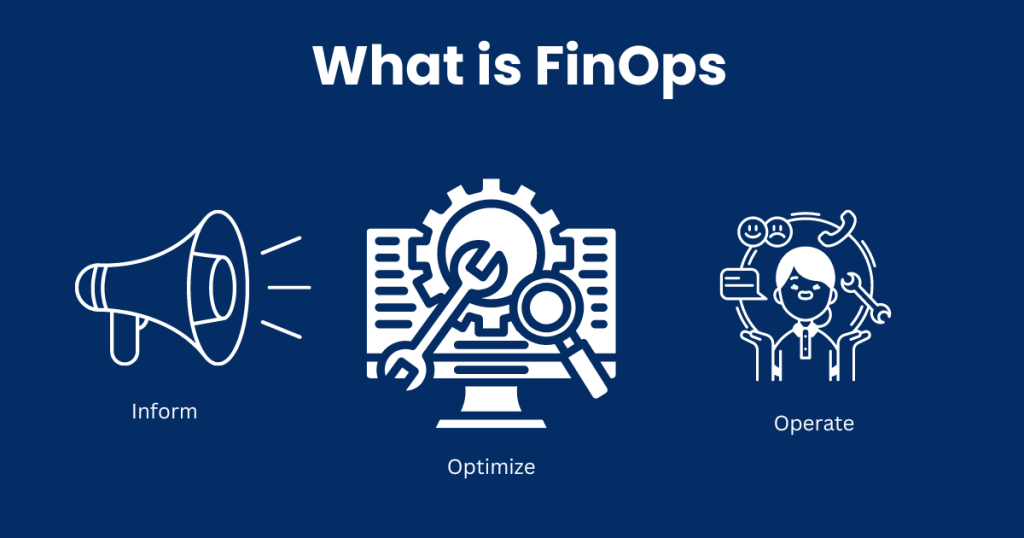
What is FinOps?
FinOps is short for Financial Operations. It is an emerging discipline that combines financial management with cross-functional collaboration to optimize the cost-effectiveness and efficiency of cloud resources. FinOps aims to bridge the gap between finance, technology, and business teams to control and manage cloud costs effectively.
Why do We need FinOps?
FinOps is important because it allows organizations to gain better control and visibility over their cloud spending. Without effective FinOps practices, businesses may overspend on cloud resources or allocate them inefficiently, leading to unnecessary costs. FinOps helps organizations optimize their cloud spending and achieve cost savings, which can significantly impact their overall financial performance.
What is the Advantage of FinOps?
- Cost savings: FinOps can help organizations save money on their cloud costs by identifying and eliminating waste.
- Improved efficiency: FinOps can help organizations improve the efficiency of their cloud operations by optimizing resources and reducing complexity.
- Better decision-making: FinOps can help organizations make better decisions about their cloud investments by providing visibility into cloud costs and usage.
- Increased agility: FinOps can help organizations increase their agility by enabling them to quickly scale up or down their cloud resources as needed.
- Improved compliance: FinOps can help organizations improve their compliance with cloud regulations by providing visibility into cloud usage and costs.
What is the feature of FinOps?
The key features of FinOps include:
- Cost Optimization: FinOps helps businesses optimize their cloud spending by identifying areas of cost inefficiency and implementing strategies to reduce unnecessary expenses.
- Budget Management: FinOps provides tools and processes for setting and managing budgets, allowing organizations to track their cloud spending and ensure it aligns with financial goals.
- Cost Allocation: FinOps enables organizations to allocate cloud costs accurately to different departments, projects, or customers, providing transparency and accountability.
- Financial Reporting: FinOps generates detailed financial reports and analytics, allowing businesses to gain insights into their cloud spending patterns and make informed decisions.
- Continuous Improvement: FinOps promotes a culture of continuous improvement by constantly monitoring and optimizing cloud spending, ensuring ongoing cost efficiency.
What are the Top 10 Use Cases of FinOps?
1. Cloud cost optimization: Identifying and eliminating unnecessary cloud expenses.
2. Budget management: Ensuring cloud spending aligns with set budgets.
3. Cost allocation: Accurately attributing cloud costs to different teams, projects, or departments.
4. Showback/Chargeback: Providing transparency on cloud costs to internal stakeholders or customers.
5. Continuous cost monitoring: Tracking and analyzing cloud spending patterns in real-time.
6. Resource utilization: Optimizing the use of cloud resources to avoid waste.
7. Forecasting and planning: Predicting future cloud costs and planning budgets accordingly.
8. Vendor cost management: Analyzing and managing costs associated with different cloud service providers.
9. Rightsizing: Adjusting resource capacities to match actual utilization needs.
10. Financial governance: Implementing policies and controls to ensure compliant and cost-effective cloud usage.
How to Implement FinOps?
To implement FinOps, organizations need to establish cross-functional teams involving finance, operations, engineering, and business units. They should adopt cloud cost management tools, define clear cost visibility and accountability, set budgets, implement cost allocation methodologies, and prioritize regular monitoring and optimization of cloud costs.
How to Get Certified in FinOps?
To get certified in FinOps, you can follow these steps:
- Choose a Certification Program: Research and select a reputable FinOps certification program that aligns with your career goals and objectives.
- Complete Training: Enroll in the certification program and complete the required training modules and coursework.
- Prepare for the Exam: Study and prepare for the certification exam by reviewing the program’s study materials, practice exams, and recommended resources.
- Take the Exam: Schedule and take the certification exam, following the program’s guidelines and requirements.
- Maintain Certification: Once you have obtained the FinOps certification, ensure you meet any ongoing requirements for maintaining your certification, such as continuing education or recertification exams.
How to Learn FinOps?
There are a number of resources available to learn about FinOps. The FinOps Foundation website is a good place to start. There are also a number of books, articles, and online courses available. Here are some most popular website for providing Certification courses: DevOpsSchool.com , scmGalaxy.com , BestDevOps.com , Cotocus.com